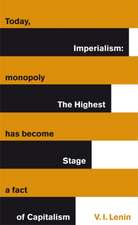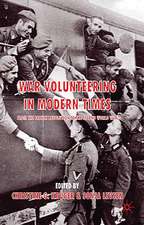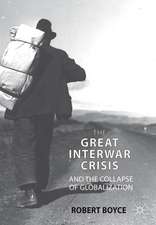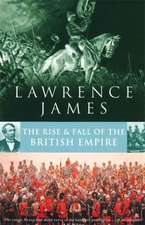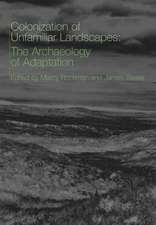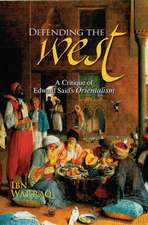Postcolonialism Meets Economics: Economics as Social Theory
Autor S. Charusheela, Eiman Zein-Elabdinen Limba Engleză Hardback – 23 oct 2003
The wide array of contributions to this book draw on the rapidly growing body of postcolonial studies to critique both orthodox and heterodox economics. This book addresses a large gap in postcolonial studies, which lacks the type of sophisticated analysis of economic questions that it displays in its analysis of culture. The intellectual and disciplinary terrain covered within this book spans economics, history, anthropology, philosophy, literary theory, political science and women's studies.
Din seria Economics as Social Theory
-
 Preț: 279.80 lei
Preț: 279.80 lei - 15%
 Preț: 528.75 lei
Preț: 528.75 lei - 8%
 Preț: 441.23 lei
Preț: 441.23 lei - 15%
 Preț: 477.90 lei
Preț: 477.90 lei -
 Preț: 295.81 lei
Preț: 295.81 lei -
 Preț: 428.46 lei
Preț: 428.46 lei - 18%
 Preț: 1439.63 lei
Preț: 1439.63 lei - 15%
 Preț: 420.28 lei
Preț: 420.28 lei - 22%
 Preț: 354.65 lei
Preț: 354.65 lei - 15%
 Preț: 426.70 lei
Preț: 426.70 lei - 22%
 Preț: 358.26 lei
Preț: 358.26 lei -
 Preț: 377.66 lei
Preț: 377.66 lei -
 Preț: 413.76 lei
Preț: 413.76 lei -
 Preț: 477.99 lei
Preț: 477.99 lei -
 Preț: 417.20 lei
Preț: 417.20 lei - 15%
 Preț: 576.47 lei
Preț: 576.47 lei - 43%
 Preț: 207.05 lei
Preț: 207.05 lei - 26%
 Preț: 766.31 lei
Preț: 766.31 lei -
 Preț: 532.58 lei
Preț: 532.58 lei - 15%
 Preț: 430.45 lei
Preț: 430.45 lei - 26%
 Preț: 850.99 lei
Preț: 850.99 lei - 15%
 Preț: 456.21 lei
Preț: 456.21 lei - 15%
 Preț: 422.26 lei
Preț: 422.26 lei - 15%
 Preț: 458.59 lei
Preț: 458.59 lei - 15%
 Preț: 470.85 lei
Preț: 470.85 lei - 26%
 Preț: 1217.42 lei
Preț: 1217.42 lei - 18%
 Preț: 1672.42 lei
Preț: 1672.42 lei - 15%
 Preț: 515.60 lei
Preț: 515.60 lei - 25%
 Preț: 251.80 lei
Preț: 251.80 lei - 18%
 Preț: 1000.27 lei
Preț: 1000.27 lei - 18%
 Preț: 1283.60 lei
Preț: 1283.60 lei - 15%
 Preț: 463.49 lei
Preț: 463.49 lei - 15%
 Preț: 478.96 lei
Preț: 478.96 lei
Preț: 1017.18 lei
Preț vechi: 1367.97 lei
-26% Nou
Puncte Express: 1526
Preț estimativ în valută:
194.67€ • 202.70$ • 164.52£
194.67€ • 202.70$ • 164.52£
Carte tipărită la comandă
Livrare economică 10-24 martie
Preluare comenzi: 021 569.72.76
Specificații
ISBN-13: 9780415287258
ISBN-10: 0415287251
Pagini: 304
Dimensiuni: 156 x 234 x 23 mm
Greutate: 0.59 kg
Ediția:1
Editura: Taylor & Francis
Colecția Routledge
Seria Economics as Social Theory
Locul publicării:Oxford, United Kingdom
ISBN-10: 0415287251
Pagini: 304
Dimensiuni: 156 x 234 x 23 mm
Greutate: 0.59 kg
Ediția:1
Editura: Taylor & Francis
Colecția Routledge
Seria Economics as Social Theory
Locul publicării:Oxford, United Kingdom
Public țintă
Postgraduate, Professional, and UndergraduateCuprins
Part 1. The Space of Postcoloniality Part 2. Economics as a Colonial Discourse of Modernity Part 3. Economics as a Contemporary Hegemonic Discourse Part 4. Toward a Non-Modernist Economic Analysis
Notă biografică
Eiman O. Zein Elabdin is Associate Professor and Chair of the Economics Deaprtment at Franklin & Marshall College, Pennsylvania.
S. Charusheela is Assistant Professor of Women's Studies at the University of Hawai'I at Manoa.
S. Charusheela is Assistant Professor of Women's Studies at the University of Hawai'I at Manoa.
Descriere
The wide array of contributions to this book draws on the rapidly growing body of post-colonial studies to critique both orthodox and heterodox economics.


